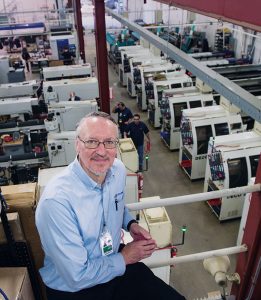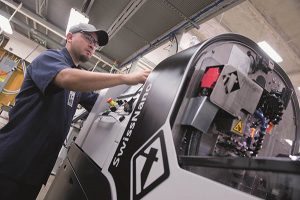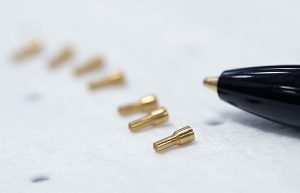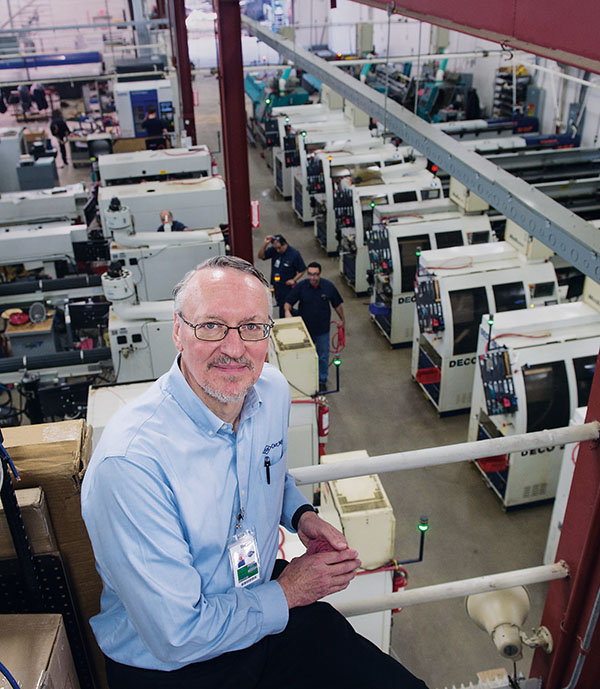When William ‘Bill’ T Cox Jr talks about his business, the conversation turns naturally to the Cox Manufacturing Company’s strapline ‘Cox delivers confidence’ – and it is technology from Tornos that helps him make good on that promise every day.

Situated in San Antonio, Texas, one of three metropolitan Texas cities that make up the Texas Triangle region, Cox Manufacturing specialises in custom screw machine products and CNC turning. The company’s customer-centric legacy began in 1956, when Cox’s father, William T Cox Sr, founded the company and started making bobbins for early computer memory systems.
“We are committed to doing what we say; we don’t give up,” states Bill Cox. “Perseverance is one of our core values. We put a lot of emphasis on building systems to manage orders and that helps us to maintain blanket order relationships and ensure quick delivery to our customers. As a result of the robust processes we have in place, our customers know they won’t encounter any surprises when they do business with us.”
Cox Manufacturing was founded with his father’s bold bid to start “some sort of manufacturing company” after coming across a Swiss-type screw machine at an auction. Though he had limited knowledge about the machine and knew next to nothing about automatic screw machines and Swiss automatics, Cox was passionate about manufacturing and had a prowess for solving engineering problems. Those were the cornerstones on which he built a business that has become a leading supplier of precision machining services throughout the US southwest. Today, Cox Manufacturing supplies high-volume, tailor-made components for some of industry’s most discerning customers in the aerospace, automotive, trucking, defence and medical technology sectors.
Bill Cox’s commitment to the family business began early. After his father’s sudden death in 1968, when he was just 12 years old, his mother took him aside and explained that Cox Manufacturing’s biggest customer was interested in buying the business. Was he interested in someday running the business himself? His answer was an emphatic, “yes,” and he was off and running in his quest to learn everything necessary to continue building on the foundation his father had established. He quickly learnt to read financial statements and joined his mother in meetings with bankers, lawyers, accountants and contractors.

“I realised early on that the diversity of our customer base was limited,” he says. “Around 80% of our business was with the electronics industry. We were highly dependent on five customers buying the same product from us. I knew that we needed to learn to make other parts.”
After attending Texas A&M University for two years, just long enough to take the courses that would serve Cox Manufacturing and its soon-to-be growing customer base, the 20-year-old Cox began working full-time at the family business.
When he joined the business full time, Cox Manufacturing was using Bechler and Index machines, as well as some Swiss-type machines and Index single-spindle cam machines, but Cox was looking to the future. He began buying up used Tornos Deco machines and today owns more than 30 of them.
“The tooling and basic machine strategies are similar, so the wealth of knowledge we had accumulated with the competitor machines was transferrable,” he says. “We found that the higher precision Tornos machines were more cost effective in the long run, despite the higher capital investment, because they were more efficient.”
Cox Manufacturing took a big leap in 1980 with its move into a new building constructed on land that Cox and his mother purchased when he was still in high school.

“When I look back, it still amazes me because nothing happened overnight. We were thinking ahead by buying that land and building the facility, moving into multi-spindle machines. Today, we have 33 Deco machines, including the Deco 10, Deco 13 and Deco 20, and we still run some Tornos R10, R125 and MS-7 cam machines. However, we are gradually retiring those and replacing them with Tornos CNC machines.”
More recently, Cox bought a new Tornos SwissNano, which is turning out to be a perfect fit for his business. As a result, this visionary entrepreneur already has his eye on further SwissNano purchases.
“The beauty of the SwissNano is the access and ergonomics,” he explains. “This makes it so much easier to work with fine, small parts. A good example is a precision brass medical part with a ±10 µm tolerance. The stability of the machine and its ease of use make the SwissNano a lot more efficient than other options. Previously, we would have made this part with a Deco 10 and, before that, on an MS-7. The SwissNano is compact and it fits nicely into the same workshop footprint as an MS-7; certainly an investment that will serve the business well for years to come.”
For further information www.tornos.com















